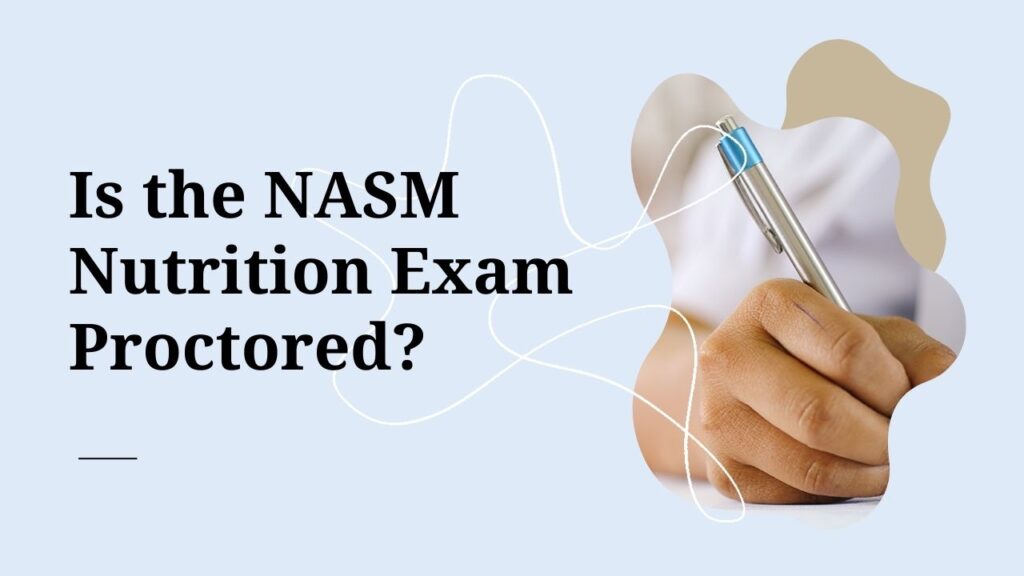Is the NASM Nutrition Exam Proctored?

If you’re considering becoming a NASM Certified Nutrition Coach (CNC), one of the first questions you might have is:
👉 Is the NASM Nutrition Exam proctored?
No, the NASM Certified Nutrition Coach (CNC) exam is un-proctored and open book. This means that test-takers can refer to their notes and study materials during the exam without live supervision.
But just because it’s open book doesn’t mean it’s easy! In this guide, I’ll break down everything you need to know about the NASM Nutrition Exam, including format, difficulty, best study strategies, and tips to pass on your first try.
What Does "Un-Proctored and Open Book" Mean?
Unlike other certification exams that require strict monitoring, the NASM CNC exam is entirely online and un-proctored. Let’s break this down:
🔹 Un-proctored: You don’t need to take the exam in a controlled testing environment with a supervisor watching you.
🔹 Open book: You can use your course materials, notes, and reference guides while answering the questions.
🔹 Remote format: The exam can be taken from anywhere, as long as you have an internet connection.
🔹 Self-paced: You can take it at your convenience within the given time frame.
💡 Pro Tip: Even though the exam is open book, don’t rely solely on searching for answers while taking the test. Preparation is key to finishing within the time limit.
NASM Nutrition Exam Format and Structure
To help you feel more confident, let’s go over the structure of the NASM CNC exam:
📌 Total Questions: 100 multiple-choice questions
📌 Time Limit: 90 minutes
📌 Passing Score: 70%
📌 Attempts Allowed: 3 (before requiring a retake fee)
The questions are based on scientific principles of nutrition, dietary guidelines, metabolism, macronutrients, micronutrients, and client coaching strategies.
✍️ Common Question Types:
✔️ Scenario-based questions (e.g., “What would be the best dietary recommendation for a client with X goal?”)
✔️ Scientific knowledge questions (e.g., “Which macronutrient provides the most energy per gram?”)
✔️ Application-based questions (e.g., “How would you design a meal plan for an athlete?”)
Is the NASM Nutrition Exam Hard?
Many people assume that an open-book exam is easy, but that’s not necessarily true. The NASM CNC exam requires critical thinking—it’s not just about looking up answers.
Factors That Make the Exam Challenging:
❌ The 90-minute limit means you must be well-prepared.
❌ Some questions are scenario-based, testing your ability to apply knowledge rather than memorize facts.
❌ The material covers scientific concepts, requiring a solid understanding of metabolism, macronutrients, and client assessments.
However, with proper study techniques, most candidates find the exam manageable.
💡 Success Tip: If you’ve studied the materials, completed practice questions, and understand nutrition fundamentals, you should pass on your first try.
How to Study for the NASM Nutrition Exam
Even though the exam is open book, preparation is still essential. Here’s a step-by-step study plan to help you pass:
1. Read Through the Official NASM CNC Study Guide
📖 Focus on key topics like macronutrients, micronutrients, metabolism, and meal planning.
2. Take Practice Tests
✅ Use NASM’s practice quizzes to familiarize yourself with question formats.
3. Make a Quick-Reference Guide
📑 Create a cheat sheet with essential formulas, definitions, and concepts to quickly refer to during the exam.
4. Review Scenario-Based Questions
🔎 Understand how to apply knowledge in real-world nutrition coaching situations.
5. Time Yourself on Practice Exams
⏳ Since you have only 90 minutes, practice answering 100 questions within that timeframe to get comfortable with pacing.
Should You Take the NASM CNC Exam?
If you’re looking to expand your knowledge in nutrition coaching and help clients achieve their dietary goals, the NASM Certified Nutrition Coach certification is an excellent choice.
📌 Pros of Taking the NASM CNC Exam:
✔️ 100% online and self-paced
✔️ Open-book format
✔️ Highly respected in the fitness industry
✔️ Provides in-depth knowledge of evidence-based nutrition
Even though it’s un-proctored, adequate preparation is crucial. Study well, take practice tests, and create a strategy for answering questions efficiently.

Posts That May Interest You